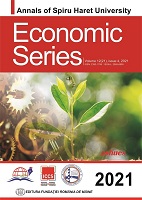THE EFFECT OF POPULATION AND FINANCIAL DEVELOPMENT ON ENVIRONMENTAL HEALTH IN NIGERIA (1980-2019)
THE EFFECT OF POPULATION AND FINANCIAL DEVELOPMENT ON ENVIRONMENTAL HEALTH IN NIGERIA (1980-2019)
Author(s): Temitope Sade Akintunde, Mathew Adagunodo, Oluwatosin Mary Aderajo, Bosede Esther AkanbiSubject(s): National Economy, Energy and Environmental Studies, Economic development, Post-War period (1950 - 1989), Transformation Period (1990 - 2010), Present Times (2010 - today), Financial Markets
Published by: Editura Fundaţiei România de Mâine
Keywords: population; financial development; environmental health; autoregressive distributive lag;
Summary/Abstract: In recent times, environmental health quality has raised issues on dynamics of population, financial development and environmental health quality in Nigeria. The present study has made an attempt to explore interlinks among these variables using Autoregressive Distributive Lag (ARDL) bound cointegration approach. The study period is from1980 to 2019. The coefficient of population has a positive and statistically significant effect on carbon emission proxy for environmental quality for both short and long-run. The coefficient market capitalization (MCP) is statistically significant at 5% level and with the positive sign in the both short-run and long-run. However, credit to private sector has negative and significant impact on carbon emission. Nigeria should develop its financial sector to enhance investment in energy saving equipment that will reduce carbon emission, hence improve environmental quality. Also, the growing population should be encouraged to use the clean form of energy for their daily activities.
Journal: Annals of Spiru Haret University. Economic Series
- Issue Year: 21/2021
- Issue No: 3
- Page Range: 149-165
- Page Count: 17
- Language: English

